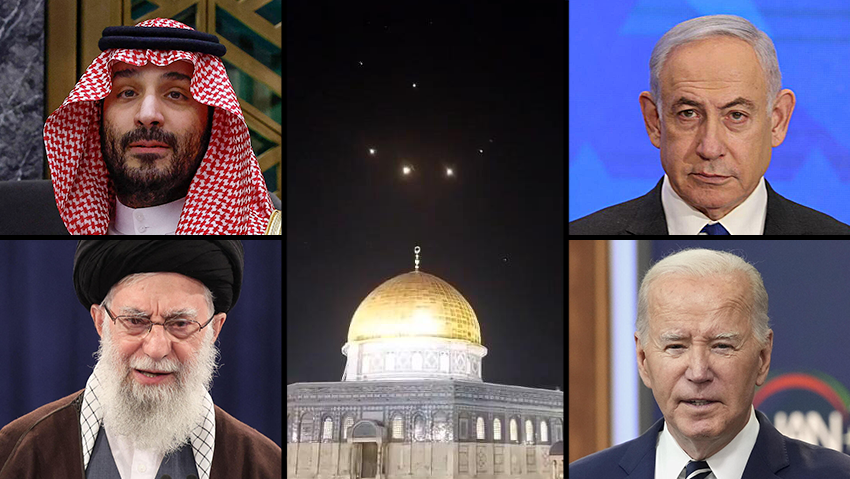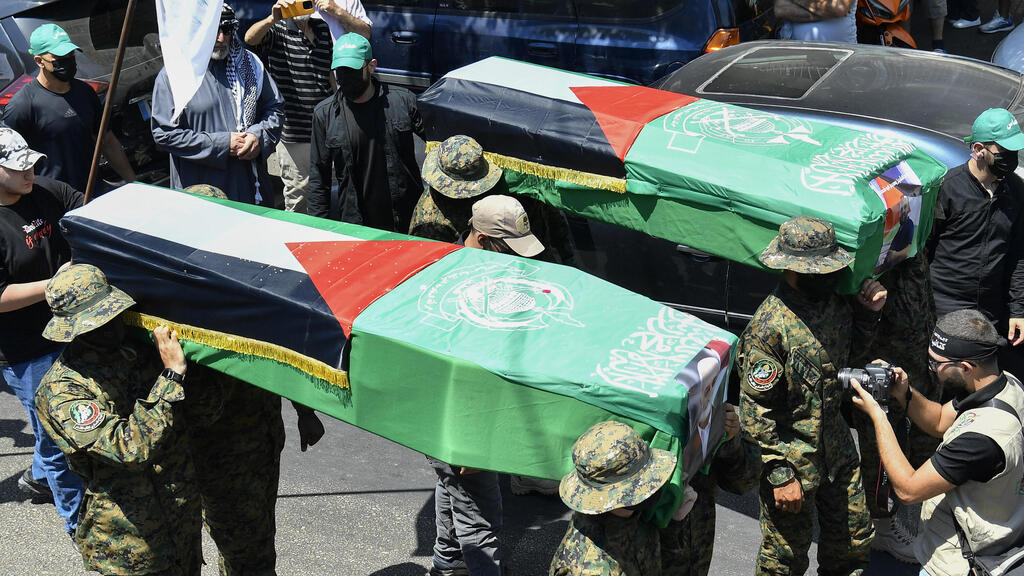Getting your Trinity Audio player ready...
It remains unclear how Iran will respond to the assassination of Ismail Haniyeh on its soil. Options include a direct attack on Israel, as reported by The New York Times on Wednesday and reportedly ordered by Ali Khamenei, or separate strikes by Iran's proxies—Hezbollah in Lebanon, pro-Iranian militias in Syria and Iraq, and the Houthis in Yemen. Alternatively, a coordinated attack involving these groups could be in the works.
Following the significant assassinations of Haniyeh and senior Hezbollah operative Fuad Shukr last week, another pressing question is which Arab countries will assist in intercepting any attack on Israel.
2 View gallery


Which Arab countries will assist in intercepting any attack on Israel
(Photo: Alex Kolomoisky, AFP, AP)
Missiles and drones potentially launched from Iraq, Iran, or Yemen would have a long journey, crossing multiple countries. During Iran’s April 14 attack, Israel and the West did not stand alone. Jordan reportedly intercepted dozens of drones launched from Iran, with some drones en route to Jerusalem being downed over Jordan’s section of the Jordan Valley and the Jordan-Syria border.
After these interceptions, Jordan faced harsh criticism, especially from Iran, for allegedly aiding Israel. Jordan's Foreign Minister, Ayman Safadi, later clarified that his country would not allow Iran or Israel to turn it into a battlefield and would address any violation of its airspace and any threat to its citizens, regardless of whether the threat originated from Israel or Iran.
Amid preparations for a possible new attack, Foreign Minister Safadi reiterated similar messages during a press conference with Luxembourg's Foreign Minister, Xavier Bettel. He stated, "We must always be vigilant at our borders. We will not allow anyone to turn Jordan into a battlefield. We must protect our country, and in case of escalation, our priority is to defend Jordan and Jordanians." He emphasized that Jordan would confront anyone attempting to violate its airspace, indicating that Jordan might respond similarly to any future attacks involving its airspace.
Jordan is not alone. The Wall Street Journal reported in April on the involvement of a U.S.-led air defense alliance in countering the Iranian attack. Arab states reportedly shared intelligence on Iran's plans and radar data. Jordan allowed the use of its airspace for U.S. and other allied fighter jets and assisted in intercepting drones and missiles.
The American newspaper also noted that Iranian missiles and drones were detected upon launch by radars in the Persian Gulf states, connected to the U.S. operations center in Qatar. Saudi Arabia and the UAE shared intelligence but refused to open their airspace. Saudi Arabia reportedly received information from Iran about the attack's outline and timing and passed it on to the U.S., which warned Israel. These Arab states likely understand that assisting with interceptions earns them favor with the U.S., potentially making the alliance effective again.
Egypt, on its part, is wary of airspace incursions. Following Israel's strike on the port city of Hudaydah in Yemen two weeks ago, the Hezbollah-affiliated Lebanese newspaper Al-Akhbar reported that Egyptian units on the border are on high alert, fearing that Houthi actions could also impact civilian aviation. Sources indicated that "air defense is ready to shoot down any foreign object entering Egypt." Thus, in case of Houthi rocket fire as part of an Iranian attack, Egypt is likely to intercept threats entering its airspace.
Meanwhile, the U.S. is preparing to send additional fighter jets to the Middle East in response to threats from Iran and its proxies in Gaza, Lebanon, and Yemen to attack Israel in the coming days, according to The New York Times, citing American officials. An anonymous U.S. military source stated that American forces in the region are taking "necessary steps" to enhance readiness for combat and to protect American troops and allies from Iranian threats and supported militias.
No final decisions have been made on the number of additional aircraft to be deployed, and approvals from top officials, including Defense Secretary Lloyd Austin, are still pending. Officials indicated a desire to manage the American response by deploying enough aircraft quickly to help defend Israel without escalating the conflict. On April 14, U.S. Air Force jets based in Jordan and Saudi Arabia, in coordination with French, Jordanian, and British air forces, intercepted over 80 drones.
Pentagon spokeswoman Sabrina Singh told reporters this evening that Secretary of Defense Lloyd Austin had updated Israel on recent and future changes in U.S. forces in the region, noting that he has not yet decided which additional defensive capabilities to deploy. "Austin informed Defense Minister Yoav Gallant of additional measures, including ongoing and future changes aimed at supporting Israel's defense," she said. She added that the changes might include deploying additional forces to the area, but Austin has not yet made a decision. "Escalation in the Middle East is not inevitable. All nations will benefit from de-escalation," she added.
Earlier, Gallant's office stated that he had discussed recent security developments and bilateral security cooperation with Austin against threats from Iran and its proxies. According to the statement, Gallant "emphasized the importance of cooperation with partners and allies to ensure regional stability." Gallant also told Austin that "the unprecedented security cooperation between Israel and the U.S. against Iran and its proxies is crucial for regional security and stability."



